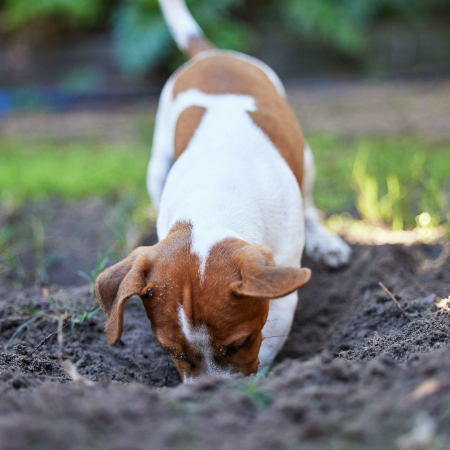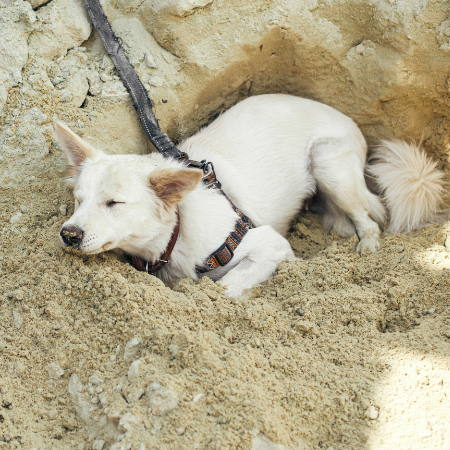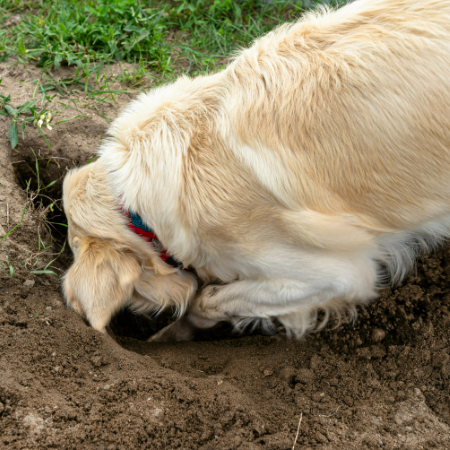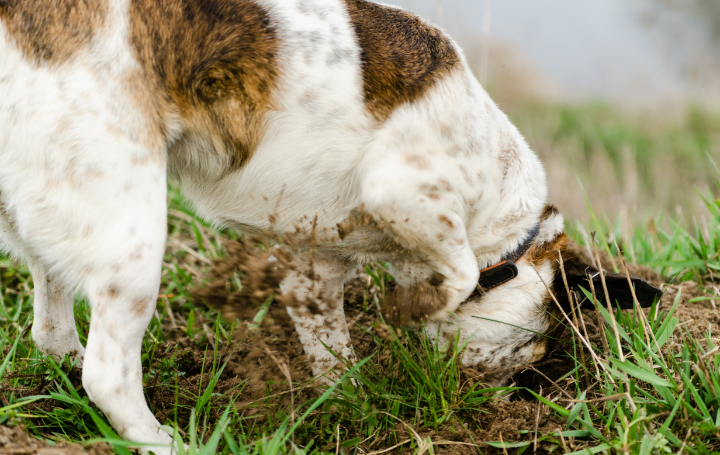Why Do Dogs Love to Dig? Understanding This Instinctual Behavior
Why do dogs love to dig? may be a question you’ve wondered if you’ve ever watched your dog turn your well-kept lawn into a maze of little craters. For many dogs, digging comes naturally, even though it might be annoying for their owners.
There’s frequently more to the muddy paw prints and strewn dirt than just random misbehavior. Let’s explore the causes of dogs’ digging behavior and how to comprehend (and control) it.
1. It’s in Their DNA
Dogs dig mostly for the straightforward reason that it is ingrained in their DNA. Wolves are the ancestors of dogs, and in the wild, these animals frequently dug for food. In the wild, wolves excavate to secure their food, build cozy dens, or even give birth to their young. Your dog is therefore channelling its primal survival impulses when it digs a hole in the yard, even though it is now enjoying the comforts of a warm bed inside your house.

Digging is more common in some dog breeds than in others. Dog breeds that were expressly bred to burrow after creatures like badgers or rabbits include terriers, dachshunds, and other hunting dogs. Digging is an instinctive, natural behavior for them.
2. To Stay Cool (or Warm!)
Did you ever notice that your dog digs on hot days? This is so that it can protect against extremely high or low temperatures. In warm weather, dogs may dig to make a cool, cozy place to rest. Dogs dig their own air conditioner because the dirt is usually colder below the surface than the air is.
Dogs will often dig throughout the winter months to make a warm, comfortable pit that will keep them warm. Its method allows them to create a safe and cozy natural bed.
3. Burying Treasure
If your dog has ever dug up a bone or a toy, it’s probably doing the same for food, which is another innate habit. In the wild, food is buried to protect it from predators and to make it last for meals later. Your dog is engaging in this age-old habit when it buryes a chew toy or bone in your flower bed, even though its food bowl is constantly full.
But it’s not just about the bones. Some dogs would even attempt to burrow shoes, socks, or other household objects. They conceal their “prized possessions” in a secure location and use this peculiar method of claiming ownership.
4. For Fun and Entertainment
It’s a fact that dogs occasionally dig just for fun! Given their innate curiosity, dogs may find amusement or relaxation in digging as a means of passing the time or letting off steam. It is played as they understand it. They like the gratification of witnessing the fruits of their labor as well as the feel and scent of the soil.
Digging could be your dog’s go-to form of entertainment if they’re bored, lonely, or haven’t had enough exercise. Particularly if there are intriguing odors or creatures concealed beneath the surface, it seems to them like an enjoyable project.
5. Hunting for Critters
In relation to animals, it’s possible that your dog is attempting to trap rats, moles, or insects in your yard by excavating. Dogs may identify critters dwelling beneath the ground that people might never notice because of their extraordinary sense of smell. They are digging to satisfy their innate need to hunt.
Your dog most likely can see or hear these little organisms even if you cannot. Because terriers were developed to hunt and flush out small animals, they possess an exceptionally strong affinity for this. Therefore, although your dog may appear to be digging randomly, they may be searching for a buried treasure.
6. Seeking Comfort or Anxiety Relief
Dogs are subject to stress and anxiety just like people are. Some dogs use digging as a coping mechanism for these emotions. When your dog is nervous, they may dig to soothe themselves. This is especially common during thunderstorms, fireworks, or when your dog is left alone.
Some dogs use digging to create a cozy and safe area—almost like building a tiny nest. Creating a sense of security is more important in this situation than any actual goal. In the event that your dog experiences environmental changes or suffers from separation anxiety, you may observe this behavior more frequently.
7. Nesting Behavior
Your female dog may be attempting to build a nest for her babies if she begins digging, particularly if she is pregnant or experiencing a false pregnancy. Her wild predecessors, when pregnant dogs would dig dens to give birth and protect their young, are the source of this urge as well.

Some female dogs may display this behavior owing to hormonal changes even if your dog is not pregnant. Their body is telling them to get a warm, safe place ready, even if puppies aren’t really on the way.
8. They Love the Smell
It is sometimes overlooked how keen a dog’s sense of smell is. Dogs usually use their noses to perceive the world, whereas humans mostly rely on sight. Your dog may begin digging to get closer to the source of a scent they find intriguing in the earth. It might be anything more profound or something as basic as a patch of dirt that has an animal odor.
Digging motivated by smells is frequently observed in regions where animals have recently been present, such as the scent of a neighbor’s dog, a squirrel that scurried by, or a rabbit burrow.
9. Attention-Seeking Behavior
Dogs occasionally dig because they know it makes you respond. They may keep digging because they’ve learned it’s a simple method to gain your attention if you’ve previously reprimanded them or chased them out of the garden. For a dog who feels neglected, attention—even unpleasant attention, can be alluring.
If you believe your dog is digging to gain your attention, consider rewarding them for good behavior. Give them praise when they’re relaxed and occupied with other things to assist in refocusing their energies.
How to Manage Digging
Now that we know why dogs enjoy digging, how can we control this behavior? Digging is an innate behavior that makes it difficult to completely eradicate; nonetheless, there are several strategies to reduce the harm digging causes to your yard:
1. Offer Enough Exercise
Boredom is a major factor in dogs’ digging behavior. Make sure your dog has enough playtime, walks, and interactive toys to keep him physically and mentally stimulated. A weary dog is less inclined to dig.
2. Create a Digging Zone
Give your dog a special place to dig, such as a sandbox, where they are welcome to engage in their favorite pastime. Toys or snacks might be concealed nearby to entice them to dig there rather than in your flower beds.
3. Discourage Unwanted Digging
If your dog is digging in places you don’t want them to, try gently guiding them back to their proper location. You might also try covering the places where they frequently dig with pebbles or installing barriers like fencing.
4. Address Anxiety
In order to address the underlying cause of your dog’s behavior, if they are digging as a result of stress or worry, think about consulting a veterinarian or trainer. Pheromone diffusers, calming sweets, or toys that lower anxiety may also be helpful.

5. Monitor for Critters
Keep an Eye Out for vermin: To address the issue gently if your dog is digging due to vermin in your yard, think about contacting a pest control expert. Your dog can become disinterested if you take away the reason they are digging.
Final Thoughts
Dogs dig naturally because they have ancient impulses that have prompted them to do so. Although it may cause owners to become frustrated, knowing the reasons behind dogs’ digging behavior can help you control and redirect it in constructive ways.
You may reconcile your desire for a lovely yard with your dog’s need for plenty of exercise and mental stimulation, as well as a safe place to dig. The next time you witness your dog digging, keep in mind that it’s simply them being dogs!
Doglime for more dog-related information.
Tags










